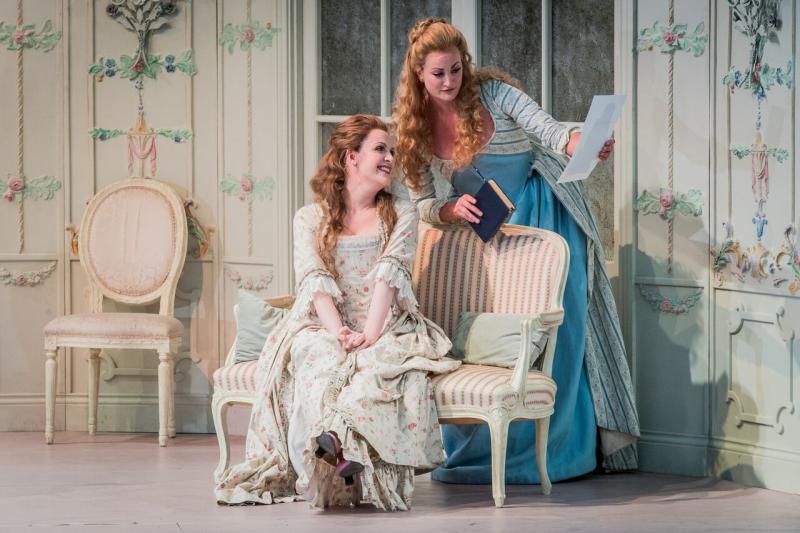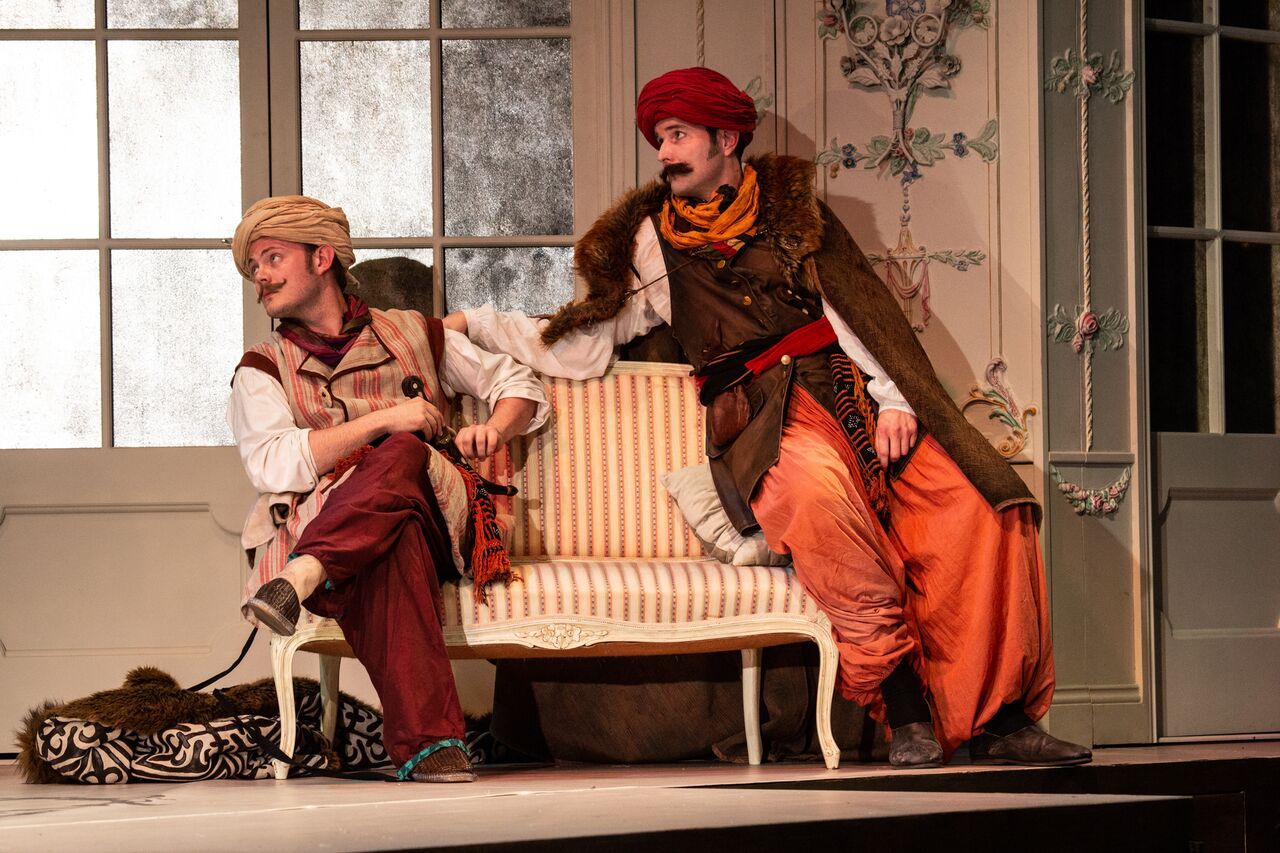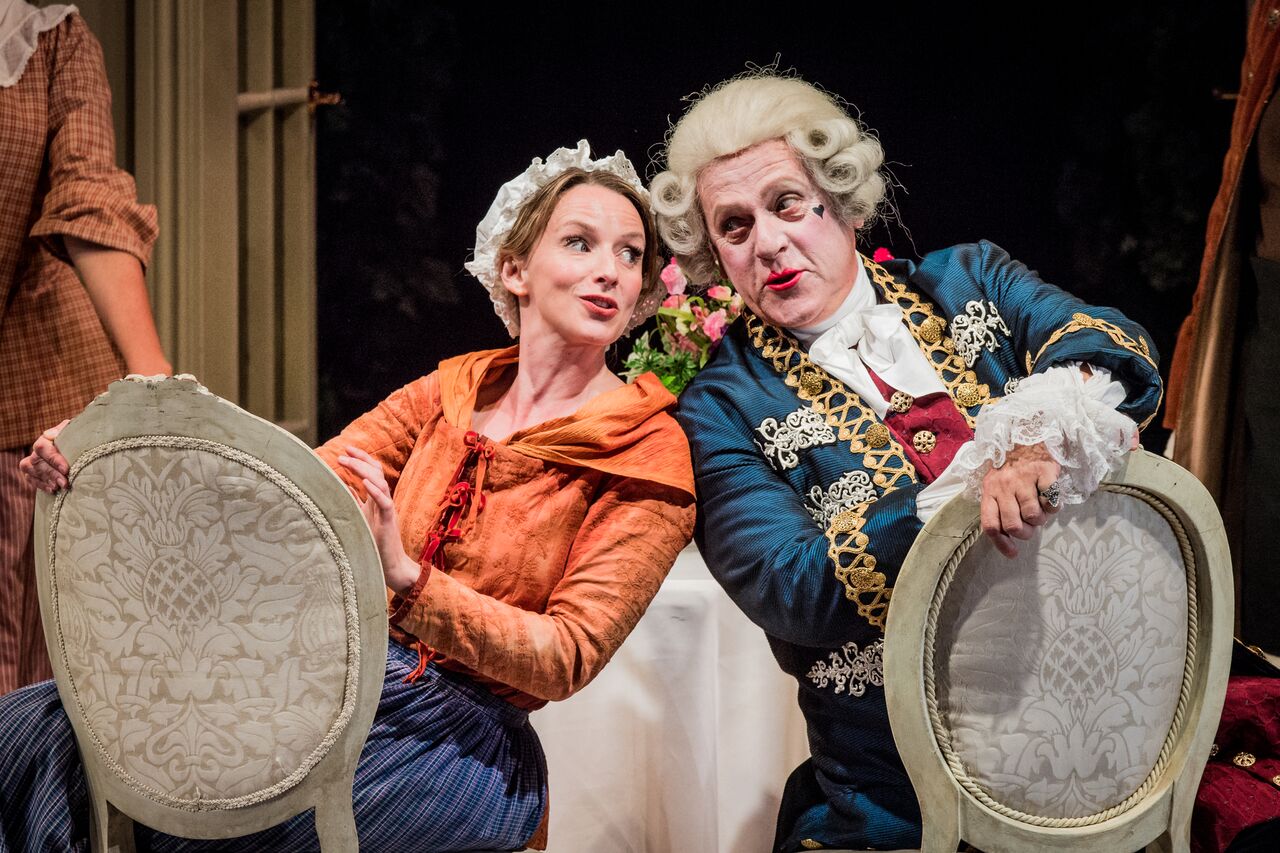Così fan tutte, Opera Holland Park review - the pain behind the prettiness | reviews, news & interviews
Così fan tutte, Opera Holland Park review - the pain behind the prettiness
Così fan tutte, Opera Holland Park review - the pain behind the prettiness
Old-world grace meets modern doubt in a well-staged, well-sung interpretation

A proper production of Così fan tutte should make you feel as if the script for a barrel-scraping Carry On film has been hi-jacked by Shakespeare and Chekhov – working as a team. The story is so silly (even nasty), the music so sublime.
On holiday in Naples, the sisters from Ferrara, Fiordiligi and Dorabella, have bid farewell to their fiancés Guglielmo and Ferrando after the sleazy old schemer Don Alfonso has arranged for the pair of pranksters to return in disguise as exotic “Albanians” in order to test the ladies’ virtue. Alfonso’s farewell trio with the two sopranos triggers a low-down intrigue that lurches between pantomime, absurdity and (for many critics, from the 19th century on) outright misogyny. Così Fan Tutte – dames, they’re all the same, ready despite all their virtue-signalling to jump into the arms and beds of the first (turbaned and mustachioed) stud to roll along. Yet that trio, "Soave sia il vento", will surely usher the souls of the blessed into whatever paradise may await us. The plot, and Da Ponte’s libretto, weaves a tissue of lies, stunts and frauds. Mozart, impossibly, makes these ditzes, jocks and stirrers sing it all into absolute truth.
With its rococo decorations, sun-dappled, flower-strewn garden rooms and warm summer shades, Oliver Platt’s production has a relaxed, even old-fashioned ambience. That initially hints at a genial, irony-free perspective on opera’s ultimate problem comedy. The action sometimes contracts to the suspicion-filled white room where Alfonso’s ruse plays out, sometimes expands to occupy the whole vast width of the Holland Park stage. The robust ranks of the Opera Holland Park chorus supply the colourful (and tuneful) Neapolitan street life. In Alyson Cummins’s design, this picturesque loveliness sets a sort of trap. There are serpents gliding through this Mediterranean garden.  As the “Albanians”, Nicholas Lester as Guglielmo and Nick Pritchard as Ferrando (pictured above by Ali Wright) swagger around in the traditional “oriental” fancy dress. The sisters – Eleanor Dennis’s Fiordiligi, Kitty Whately’s Dorabella – flounce and purr as Georgian belles who could have stepped from a Gainsborough frame. At first, the bitter, mirthless Cosìs of some recent directors feel a long sea voyage away. Uniformly strong, a young cast balances larks with grace as the ever-changing score demands. Dennis brings a fine dramatic presence to her shattering soliloquy "Per pietà". The honey-voiced Pritchard commands some show-stealing moments in Act II – not least in the duet with Fiordiligi, "Fra gli amplessi", as the lads’s game of “get off with your mate’s girlfriend” deepens into music of exquisite, excruciating ambiguity.
As the “Albanians”, Nicholas Lester as Guglielmo and Nick Pritchard as Ferrando (pictured above by Ali Wright) swagger around in the traditional “oriental” fancy dress. The sisters – Eleanor Dennis’s Fiordiligi, Kitty Whately’s Dorabella – flounce and purr as Georgian belles who could have stepped from a Gainsborough frame. At first, the bitter, mirthless Cosìs of some recent directors feel a long sea voyage away. Uniformly strong, a young cast balances larks with grace as the ever-changing score demands. Dennis brings a fine dramatic presence to her shattering soliloquy "Per pietà". The honey-voiced Pritchard commands some show-stealing moments in Act II – not least in the duet with Fiordiligi, "Fra gli amplessi", as the lads’s game of “get off with your mate’s girlfriend” deepens into music of exquisite, excruciating ambiguity.
Kitty Whately’s Dorabella finds rich hues of perplexity and darkness in the (supposedly) flightier sister’s role. As Despina, the megalomaniac maidservant who conspires with Alfonso, Sarah Tynan (pictured below by Robert Workman with Peter Coleman-Wright) has an agility and assurance – especially when in disguise as doctor and lawyer – that reveal the character’s sinister as well as charming side. Mordant, even rasping, Peter Coleman-Wright’s Alfonso rightly sounds more cynical roué than Enlightenment-era “philosopher”. So much of Così rests on the nuanced symmetries and reflections of the score, as duets, trios and even sestets match, augment or sometimes cancel out each other. For all its comeliness, Platt’s staging made that implacable internal logic – the critic Edward Said even speaks of Mozart’s “cold mastery” – clearly visible.  Step by step, trick by trick, the tone darkens, both emotionally and (as night falls over Holland Park and candles illuminate the boudoirs and gardens of Naples) physically as well. Virtually no staging today can ever swallow whole the fanciful finale of Così, with the duped girls meekly accepting their fate as guinea-pigs for Alfonso’s abusive experiments. Platt duly tweaks the closing scene in ways that (for me) recalled the revisionist endings we now expect in Shakespeare’s The Taming of the Shrew.
Step by step, trick by trick, the tone darkens, both emotionally and (as night falls over Holland Park and candles illuminate the boudoirs and gardens of Naples) physically as well. Virtually no staging today can ever swallow whole the fanciful finale of Così, with the duped girls meekly accepting their fate as guinea-pigs for Alfonso’s abusive experiments. Platt duly tweaks the closing scene in ways that (for me) recalled the revisionist endings we now expect in Shakespeare’s The Taming of the Shrew.
Brisk and sharp, Dane Lam’s conducting steered the City of London Sinfonia away from the romantic yearning that can smother some performances. He grasps that Mozart layers this uniquely bittersweet sound-world – how does he do it? – with so much pathos, melancholy, anguish even, that it needs no bossy over-emphasis. On the surface, this Così rocks no boats and will win few plaudits for sheer originality. Yet, as the Holland Park peacocks added their own eerie embellishments and the evening’s promised thunder stayed away, it needed no gimmicks. The storms within the music had already struck with their heart-breaking, life-changing force.
rating
Explore topics
Share this article
The future of Arts Journalism
You can stop theartsdesk.com closing!
We urgently need financing to survive. Our fundraising drive has thus far raised £49,000 but we need to reach £100,000 or we will be forced to close. Please contribute here: https://gofund.me/c3f6033d
And if you can forward this information to anyone who might assist, we’d be grateful.

Subscribe to theartsdesk.com
Thank you for continuing to read our work on theartsdesk.com. For unlimited access to every article in its entirety, including our archive of more than 15,000 pieces, we're asking for £5 per month or £40 per year. We feel it's a very good deal, and hope you do too.
To take a subscription now simply click here.
And if you're looking for that extra gift for a friend or family member, why not treat them to a theartsdesk.com gift subscription?
more Opera
 La bohème, Opera North review - still young at 32
Love and separation, ecstasy and heartbreak, in masterfully updated Puccini
La bohème, Opera North review - still young at 32
Love and separation, ecstasy and heartbreak, in masterfully updated Puccini
 Albert Herring, English National Opera review - a great comedy with depths fully realised
Britten’s delight was never made for the Coliseum, but it works on its first outing there
Albert Herring, English National Opera review - a great comedy with depths fully realised
Britten’s delight was never made for the Coliseum, but it works on its first outing there
 Carmen, English National Opera review - not quite dangerous
Hopes for Niamh O’Sullivan only partly fulfilled, though much good singing throughout
Carmen, English National Opera review - not quite dangerous
Hopes for Niamh O’Sullivan only partly fulfilled, though much good singing throughout
 Giustino, Linbury Theatre review - a stylish account of a slight opera
Gods, mortals and monsters do battle in Handel's charming drama
Giustino, Linbury Theatre review - a stylish account of a slight opera
Gods, mortals and monsters do battle in Handel's charming drama
 Susanna, Opera North review - hybrid staging of a Handel oratorio
Dance and signing complement outstanding singing in a story of virtue rewarded
Susanna, Opera North review - hybrid staging of a Handel oratorio
Dance and signing complement outstanding singing in a story of virtue rewarded
 Ariodante, Opéra Garnier, Paris review - a blast of Baroque beauty
A near-perfect night at the opera
Ariodante, Opéra Garnier, Paris review - a blast of Baroque beauty
A near-perfect night at the opera
 Cinderella/La Cenerentola, English National Opera review - the truth behind the tinsel
Appealing performances cut through hyperactive stagecraft
Cinderella/La Cenerentola, English National Opera review - the truth behind the tinsel
Appealing performances cut through hyperactive stagecraft
 Tosca, Royal Opera review - Ailyn Pérez steps in as the most vivid of divas
Jakub Hrůša’s multicoloured Puccini last night found a soprano to match
Tosca, Royal Opera review - Ailyn Pérez steps in as the most vivid of divas
Jakub Hrůša’s multicoloured Puccini last night found a soprano to match
 Tosca, Welsh National Opera review - a great company reduced to brilliance
The old warhorse made special by the basics
Tosca, Welsh National Opera review - a great company reduced to brilliance
The old warhorse made special by the basics
 BBC Proms: The Marriage of Figaro, Glyndebourne Festival review - merriment and menace
Strong Proms transfer for a robust and affecting show
BBC Proms: The Marriage of Figaro, Glyndebourne Festival review - merriment and menace
Strong Proms transfer for a robust and affecting show
 BBC Proms: Suor Angelica, LSO, Pappano review - earthly passion, heavenly grief
A Sister to remember blesses Puccini's convent tragedy
BBC Proms: Suor Angelica, LSO, Pappano review - earthly passion, heavenly grief
A Sister to remember blesses Puccini's convent tragedy
 Orpheus and Eurydice, Opera Queensland/SCO, Edinburgh International Festival 2025 review - dazzling, but distracting
Eye-popping acrobatics don’t always assist in Gluck’s quest for operatic truth
Orpheus and Eurydice, Opera Queensland/SCO, Edinburgh International Festival 2025 review - dazzling, but distracting
Eye-popping acrobatics don’t always assist in Gluck’s quest for operatic truth

Add comment